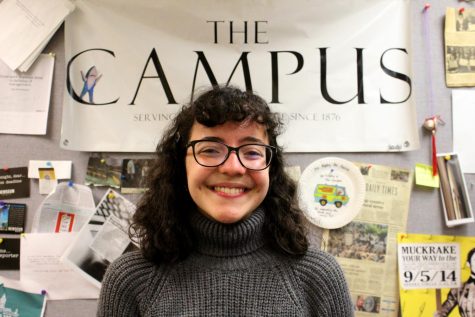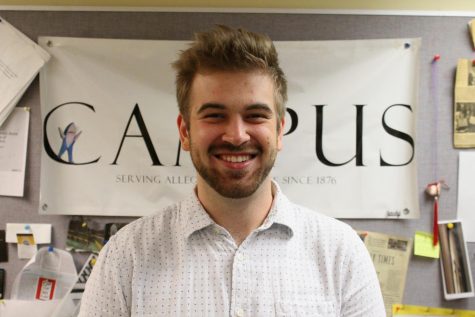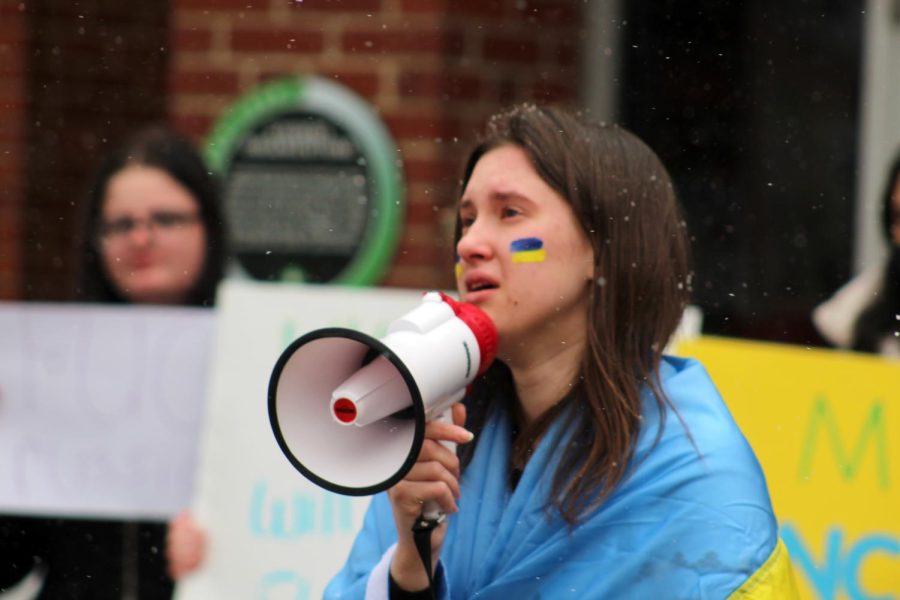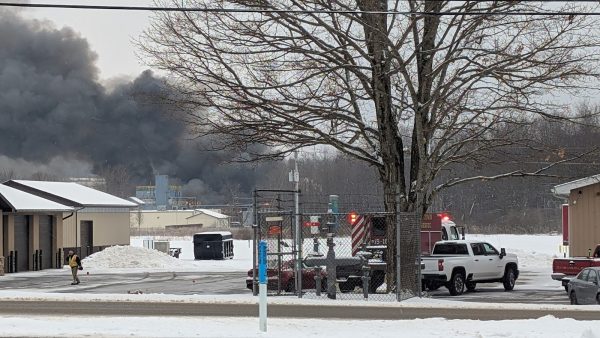‘I am not sad, I am mad’: community gathers on quad for Ukraine
Ukranian first-year student speaks out about Russian invasion of her home country
Despite the snow and frigid temperatures, large numbers of students, staff, administrators and faculty alike stood in solidarity outside the Henderson Campus Center at noon on Friday, Feb. 25.
Students held yellow, blue and white signs with messages such as “we stand with Ukraine” and “Ukraine will never surrender.” Blank posters and markers assembled on a table gave students the chance to design their own signs. A QR code brought those who scanned it to resources on what was happening in Ukraine, as well as places to donate.
In the middle of it all, the Ukrainian flag draped across her shoulders, was Sasha Shafran, ’25, originally from Ukraine with family still residing there. The protest was organized to show solidarity and to bring the Allegheny community together against the Russian invasion of Ukraine that took place as early as 4:00 a.m. Eastern European Time Thursday, Feb. 24 (9:00 p.m. eastern time Wednesday). Signs advertising the protest began circulating the evening of Feb. 24, not 24 hours before the scheduled event, both on social media and in various spots on campus. Nevertheless, the turnout was significant.
After introducing herself, Shafran recounted her family’s flight from their home. They woke up to bombs in the early hours of the morning and were forced to flee. She expressed outrage over the brutality exerted by the Russian soldiers, who she said were shooting children as young as kindergartners.
Shafran asked everyone in attendance to call embassies and representatives of countries and inform them of the circumstances of this protest: “there is a 17-year-old child standing in front of you crying and begging to save her family and her country, because that is what’s really happening.”
“I’m not sad,” Shafran said, stressing that she did not want pity from anyone. “I am mad … you don’t have to be sorry. You have to take action.”
Following this call to action was a minute of silence, then the playing of the Ukrainian national anthem. Once the song was over, Shafran recounted a story exemplifying the courage of the Ukrainian people. A group of Ukrainian soldiers on an island received a call from a Russian officer warning them to surrender or face death, and one of the Ukrainian soldiers told him, “go f— yourself.” All of these soldiers were believed to be dead within three hours of this conversation, but recent reporting reveals that they are all alive.
After telling this story, however, Shafran emphasized that the fight was not solely about Ukrainian land.
“It’s about the freedom (of the Ukrainian people),” Shafran said.
Shafran ended her speech by thanking those in attendance but invited everyone to stay and talk to her.
Even though fellow students formed a large part of the protest group, several notable faculty members were also part of the congregation. One such individual was Provost Ron Cole, ’87, who expressed sorrow regarding the crisis in Ukraine.
“I would hope that our community would come together and support (Shafran), support others connected to Ukraine and find ways to bring peace to the world,” Cole said.
Also in attendance was Jaime Kinder, the mayor of Meadville. She pointed out that although this situation is transpiring across the ocean, the lives affected are no less worthy of consideration.
“It hits close to home because we have a baby here that is (hurting) because she has first-hand knowledge, but it’s important that we understand that this isn’t so far away from us,” Kinder said. “These are people … this is a human rights issue.”
President Volodymyr Zelenskyy of Ukraine agreed to negotiations with President Vladimir Putin of Russia on Sunday, Feb. 27. Delegates from the two countries met in Belarus on the afternoon of Monday, Feb. 28. Although the talks lasted for hours, according to a CBS article, no concrete agreements were made.
Professor of History and Global Health Studies Kenneth Pinnow spoke about these developments. That these discussions occurred in the first place took him by surprise, but does not have much optimism regarding potential settlements.
“I think any time that the parties are talking is a good thing,” Pinnow said. “We just have to be very realistic about the likelihood of there being an agreement in the near term.”
Pinnow believes that Monday was not the last day that Russia and Ukraine would try to come to a compromise, and he expects that between now and the next round of negotiations, the fighting will only increase — perhaps to persuade the other side to reconsider their positions or to gain an upper hand in these negotiations. He does not see either party, specifically Russia given that the country has committed itself to the invasion of Ukraine, giving in without a fight.
“My understanding is that the Russians are still holding onto their basic … demands in terms of recognizing Crimea, a neutral Ukraine,” Pinnow said. “The Ukrainians obviously are worried about sovereignty, and they may be willing to talk about their military neutrality, but that’s going to become harder and harder the longer the war goes on.”
As for Shafran, she was not surprised at the lack of compromise that resulted from Monday’s discussions.
“The guy who was representing Ukraine at this meeting, I know him really well, because he’s lowkey close to my family, because that’s how it works in Ukraine,” Shafran said. “You probably know every politician in person … I knew what his intention was, so it was kind of easier for me, but I also realize that his intention is (the) same as mine, but it’s not something that will satisfy Russia or Belarus.”
Bringing Pinnow’s fears into fruition, Shafran has noticed a definite increase in Russian attacks, but she is trying to see the positives in these developments.
“At some point, (Russia) will just run out of money, and including all the sanctions … we can just make a conclusion that this is going to have an ending point,” Shafran said.
Shafran compared Putin to Hitler in terms of his actions and speeches and speculated that the Russian president will meet a similar end as that of the German dictator, dying either in the same fashion or assassinated by the order of a group of rich Russians.
Shafran attended a private high school in Kyiv and formed close bonds with other students and teachers. Currently, she is making use of those bonds by supporting initiatives to continue the education of Ukrainian children. On Monday, she encouraged the forming of a school, which would run from 10:00 a.m. to 8:00 p.m. Activities the children would engage in included playing Kahoots and painting.
“Half of the classes were like how to fight your fear, how to deal with panic attacks, how to help your younger brother or sister, how to help your children in this situation,” Shafran added. “I was basically just giving some classes to the children today and yesterday.”
In addition, Shafran is working on what she described as an “emergency line,” where children can text or call her if they are feeling scared.
When asked if she had anything else she would like to say, Shafran’s response was simple: “f— Putin.”

Sofia Hassan is a second-year student from New Castle, Pennsylvania. She plans to major in English Creative Writing and minor in Middle East and North...

Roman Hladio is a senior from Wexford, Pennsylvania. He is studying English with a creative writing emphasis, and completing requirements for a Journalism...

Sami Mirza is a senior from many different places. He is majoring in International Studies with a focus on the Middle East and North Africa and minor in...










